动词的语态专题
2023年高考英语考前必练 谓语动词的时态语态(含近三年真题及解析)
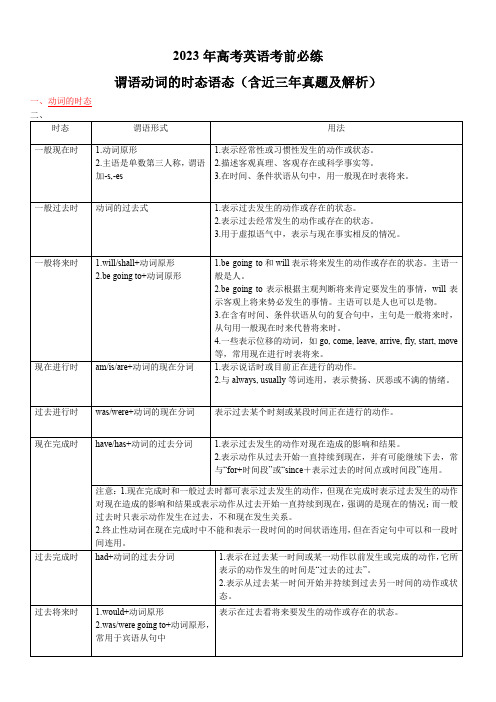
2023年高考英语考前必练谓语动词的时态语态(含近三年真题及解析)一、动词的时态特殊用法1.在时间、条件和让步状语从句中,如果主句谓语动词是一般将来时,从句用一般现在时。
如:We’ll have a picnic if it is fine next Sunday.如果下个星期日天气晴朗,我们将去野餐。
I’ll call you as soon as I get to Beijing tomorrow.我明天一到北京就给你打电话。
2.某些表示起始、往返、出发、到达之意的动词,可用一般现在时表示按规定、计划或安排将要发生的动作(此时一般都有一个表示未来时间的状语)。
这类动词有:begin, come, go, leave, start, arrive, end, stop, open, close等。
如:The meeting begins at 2:00 p.m. tomorrow.这个会议明天下午2点开始。
The next train leaves at 7 o’clock this evening.下一列火车将在今晚7点离开。
3.现在进行时与always, continually, forever等副词连用,表示反复出现或习惯性的动作,这种用法往往表达说话人的某种感情,如赞扬、遗憾、讨厌或不满等。
如:The rich woman is always laughing at the poor.这个有钱的夫人总是嘲笑穷人。
4.现在完成时中表示短暂动作的动词不能与for, since等引导的时间状语连用。
如与一段时间连用,要把瞬间动词转化为意思相近的延续性动词。
常见的变化有:特殊用法1.open,lock,write,read,sell,clean,wash,cut,drive等词作不及物动词时,它们的主语为物,可用主动语态表示被动意义。
如:This kind of pen writes very smoothly.这种钢笔写起来很流畅。
初中英语语法专项8动词的时态和语态
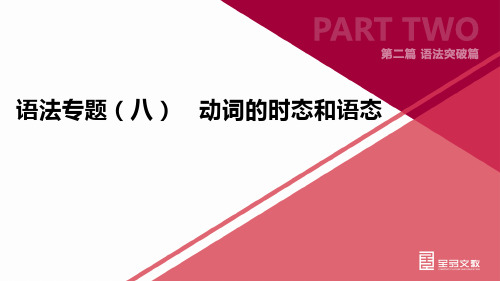
【中考考点】
(1)动词的第三人称单数形式、过去式、过去分词和现在分词的构成。 (2)动词的八种时态的基本结构及用法。 (3)动词的被动语态的基本结构及用法。 (4)动词的主动形式表示被动意义的用法。
动词的时态
考点一 一般现在时
1.结构 一般现在时主要用动词原形表示(当主语是第三人称单数时,谓语动词用第三人称单数形式)。 2.动词的第三人称单数形式变化规则 (1)直接加-s。如:work—works (2)以“辅音字母+y”结尾的词,先变y为i,再加-es。如:carry—carries, cry—cries, try—tries, study—studies (3)以s, x, o, ch, sh结尾的词加-es。如: pass—passes, fix—fixes, go—goes, do—does, teach—teaches, wash—washes (4)特殊:have—has, are—is
动词的时态
考点四 过去将来时
1.结构 would+动词原形 was/were+going to+动词原形 2.用法 表示从过去的某一时刻看,将要发生的动作。 His uncle said that there would be a good harvest the next year.他叔叔说第二年会有一个 好收成。 【注意】 在由if引导的条件状语从句中,如果主句用过去将来时,那么if从句需用一般过去时代替过 去将来时。 If he were here, he would show us how to do it. 如果他在这儿,他就会向我们展示该如何做。
动词的时态
4.动词过去式的变化规则 (1)一般情况下,在动词原形后加-ed。如: watch—watched (2)以不发音的字母e结尾的加-d。如:live—lived (3)以“辅音字母+y”结尾的,变y为i,再加-ed。如: study—studied, carry—carried, cry—cried (4)以重读闭音节结尾,且末尾只有一个辅音字母的,先双写该辅音字母,再加-ed。如: stop—stopped, plan—planned, prefer—preferred (5)不规则动词的过去式需特殊记忆。
动词的主动语态和被动语态用法详解

动词的主动语态和被动语态用法详解动词是句子的中心,表示动作或状态。
在英语中,动词有两种语态:主动语态(active voice)和被动语态(passive voice)。
通过使用不同的语态,我们可以改变句子的重点和结构。
本文将详细介绍动词的主动语态和被动语态的用法及特点。
一、主动语态的用法主动语态表示主体直接进行动作,强调主体的主动性和行为的执行者。
1. 陈述句主动语态的陈述句通常是由主语+动词+宾语的形式构成。
例如:- They eat apples.(他们吃苹果。
)- She writes a letter.(她写信。
)2. 疑问句主动语态的疑问句通常是由助动词+主语+动词的形式构成。
例如:- Do you like ice cream?(你喜欢冰淇淋吗?)- Does he speak French?(他会说法语吗?)3. 否定句主动语态的否定句通常在助动词前加上not。
例如:- They do not play soccer.(他们不踢足球。
)- She does not watch TV.(她不看电视。
)二、被动语态的用法被动语态表示主体是动作的承受者,强调动作对主体的影响和结果。
1. 陈述句被动语态的陈述句通常是由宾语+be动词+过去分词构成,并且常常省略主语。
例如:- Apples are eaten.(苹果被吃了。
)- The letter was written.(这封信已经被写了。
)2. 疑问句被动语态的疑问句通常是由be动词和主语颠倒位置构成,并且常省略by短语,表示不知道动作的执行者。
例如:- Are you invited to the party?(你被邀请参加派对了吗?)- Was the book taken?(这本书被拿走了吗?)3. 否定句被动语态的否定句通常在be动词后加上not。
例如:- Apples are not eaten.(苹果没有被吃。
)- The letter was not written.(这封信没有被写。
初中英语人教版 中考 语法专题 10 动词的时态和语态
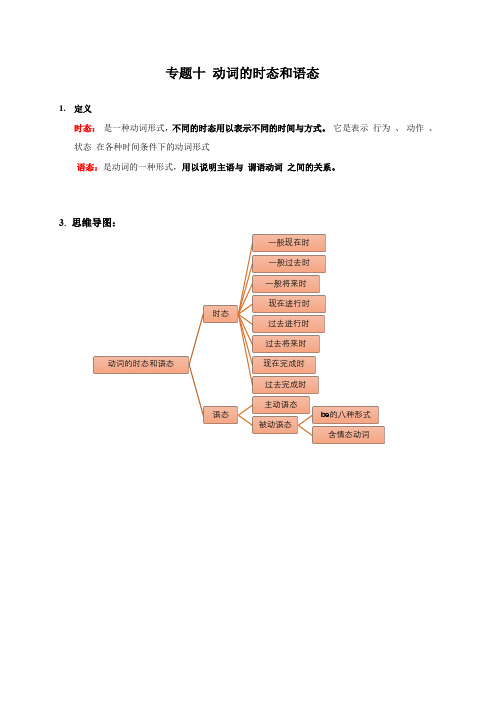
专题十动词的时态和语态1.定义时态:是一种动词形式,不同的时态用以表示不同的时间与方式。
它是表示行为、动作、状态在各种时间条件下的动词形式语态:是动词的一种形式,用以说明主语与谓语动词之间的关系。
3. 思维导图:动词的时态和语态时态一般现在时一般过去时一般将来时现在进行时过去进行时过去将来时现在完成时过去完成时语态主动语态被动语态be 的八种形式含情态动词1.动词的时态1.常考的时态构成及用法a.一般现在时d.现在进行时e.过去进行时f.过去将来时g.现在完成时h.过去完成时2. 动词的语态a. 分类:主动语态:表示主语是动作的执行者被动语态:表示并语是动作的执行者c.主动语态和被动语态的转换规则典型例题总分:50分姓名:得分:1.单选题(每小题1分,共50分)( ) 1. Jenny, together with the Greens the White Tower Park if it tomorrow.A.are going to; isn't rainyB.is going to; doesn't rainC.are going to; won't rainD.is going to; isn't rain( ) 2. The old man for quite some time.A.has diedB.dieC.has deadD.has been dead( ) 3. It is reported that a tall building in the city next year.A.will be builtB.were buildC.have builtD.will build( ) 4. My sister for 2 years.A.has marriedB.have got marriedC.has been marriedD.married( ) 5. Chinese ________in many schools around the world and many people love to learn it.A.teachesB.is teachingC.has taughtD.is taught( ) 6. When Tom was in primary school, he ________the piano every day.A.playsB.playedC.was playingD.has played( ) 7. A baby's first month birthday is a special event in China and _____with a special Party.A.celebratesB.is celebratedC.was celebratedD.will celebrate( ) 8. -Were you at home at 9 o'clock last night?-Yes, I a shower at that time.A.tookB.was takingC.was takenD.am taking( ) 9. National Day celebrations for China's seventieth birthday in about three months.A.will be heldB.will holdC.is heldD.was held( ) 10. We don't know if he tomorrow. If he, I will call youA.will come, will comeB.will come, comeses, will comees, comes( ) 11. He told me that he ______ his uncle in Thailand the next day.A.will visitB.has visitedC.is going to visitD.would visit( ) 12. -Tom, do you know ________? -In Beijing.A.where will the 24th Winter Olympics be heldB.where the 24th Winter Olympics will holdC.where the 24th Winter Olympics will be heldD.where will the 24th Winter Olympics hold( ) 13. Peter with his classmates ________ for the bus when the earthquake happened.A.is waitingB.was waitingC.are waitingD.were waiting( ) 14. his museum ________ here for over 80 years. It ________ one of the oldest buildings in this city.A.is; wasB.had been; isC.was; has beenD.has been; is( ) 15. -Mrs. Brown, how long can books from the school library ?-At most two weeks.A.borrowB.keepC.be borrowedD.be kept( ) 16.-An AI robot _____in our school dining hall next term.-I'm looking forward to it.A.will useB.will be usedC.is usedD.was used( ) 17. Usually a baby's face ____ smooth.A.is feelingB.feltC.feels likeD.feels( ) 18. She _____ an English magazine when I came in.A.readsB.has readC.will readD.was reading( ) 19. I will call you as soon as he______ here.A.arriveB.will arriveC.arrivesD.arrived( ) 20. Boys and girl, ______ learning and have fun!A.keepB.to keepC.keepingD.kept( ) 21. There ______a basketball game between these two grades in the gym this afternoon.A.willB.is going to haveC.is going to beD.will have( ) 22. We ______TV from seven to nine last night.A.were watchingB.will watchC.watchedD.watch( ) 23. Jack's mother taught me how ________ Yunnan rice noodles last weekend.A.to makeB.makingC.makeD.to making( ) 24. Mrs. Green said the plates ________ right away,or they would become difficult to wash.A.will be washedB.should washC.will washD.should be washed( ) 25. The documentary Under the Dome (《苍穹之下》)which ________ by Chai Jing showed us that the air pollution in China was very serious.A.producesB.producedC.is producedD.was produced( ) 26. -What did you do last night?- I ________ my homework and watched TV.A.didB.doC.am doingD.will do( ) 27.The hospital is very famous. It _______ in 2001.A.buildsB.builtC.was builtD.is built( ) 28.These rules are made the disabled.A.protectB.protectedC.to protectD.protecting( ) 29. -How much does the TV ?-Not too much. It's just a second-handed one.A.costB.spendC.takeD.pay for( ) 30. -Have you ever ________ an amusement park?- Yes, I have ________ Fun Times Amusement Park last year.A.been to, have gone toB.gone to, have been toC.go to, went toD.been to, went to( ) 31.We are glad to hear that the terrorists ________ by the brave policemen several days ago.A.are caughtB.were caughtC.have been caughtD.are going to be caught ( ) 32. -Why didn't you go to the party last night? - Because I _____.A.wasn't invitedB.didn't invitedC.haven't invitedD.don't invited ( ) 33. -What _____ you supposed ____ when you are in China?- You should shake hands.A.are, to doB.do, to doC.are, doingD.have, to do( ) 34. So far, we ________ English for three years.A.have learntB.learnC.learntD.had learnt( ) 35.The boy was made ______ the words again and again.A.copyB.copyingC.copiesD.to copy( ) 36. The sports meeting in our school now.A.being heldB.is havingC.is holdingD.is being held( ) 37. The window ____ ten minutes ago, and the room is bright now.A.can be cleanedB.is cleanedC.was cleanedD.will be cleaned( ) 38. -Oh, Mrs. King, your necklace looks nice. Is it new?-No, I _______ it for 2 years.A.hadB.have hadC.boughtD.have bought( ) 39. He has ordered a watch on line for his father and it _______ to him before Father's Day.A.sendB.will be sentC.was sentD.sent( ) 40. There ______ a funny cartoon on CCTV 6 this evening.A.willB.will haveC.is going to beD.is going to have( ) 41. -________ did your uncle leave his home town? -He ___________ for nearly twenty years.A.When, has leftB.When, has been awayC.How long, has leftD.How long, has been away ( ) 42. My uncle ________ Germany on business many times.A.has been onB.has gone toC.has been toD.has been in( ) 43. Her life ________ a lot during the last three years.A.changedB.changingC.has changedD.will change( ) 44. -Lisa was seen ______ an old man go across the street this morning. -What a kind girl she is!A.helpingB.helpedC.to helpD.helps( ) 45. My computer has broken down. I'll get it _______ this afternoon.A.repairsB.repairedC.to repairD.repairing。
高一英语语法动词的时态语态

高一英语语法动词的时态语态高一英语语法动词时态语态1一般现在时1、表示经常发生的习惯性的、现在反复出现的动作或状态,常用的时间状语有:always,usually,seldom,sometimes,everyday,nowandthen,onceaweek等。
2、表示眼下或目前等现在时间所发生的动作或存在的状态,这种状态带有一定的持续性。
3、表示客观事实或普遍真理。
4、书报的标题,的叙述,小说、戏剧、电影等情节介绍,图片的说明等。
6、在时间、条件、方式、让步状语从句中,表示将来的动作。
注意:一般现在时可以用于定语从句或宾语从句中表示将来。
7、用在某些表达中,表示现在正在发生的动作或存在的状态。
高一英语语法动词时态语态2一般过去时1、表示在过去某一时间点发生的动作或所处的状态,与现在没有关系。
常用的时间状语有:yesterday,lastnight,atthattime等。
2、表示在过去某一段时间里反复出现的动作或状态,与现在没有关系。
3、用usedtodo或woulddo表示过去经常或反复发生的动作。
4、有些情况发生的时间没清楚表明,但实际上是“刚才,刚刚”发生的,属于过去时间,应使用过去时态。
常见的有Ididn’tknow…或Iforgot…等。
5、一般过去时可与today,thisweek,thismonth等时间状语连用。
高一英语语法动词时态语态3一般将来时1、will/shalldo(1)表示将来会出现的动作或状态。
常用的时间状语:thisevening,tomorrow,nextweek/month…,attheendofthisterm,inafewminutes等。
(2)表示将来经常发生的动作。
(3)表示事物的固有属性或必然趋势、倾向。
(4)表示说话过程中做出某种决定。
注意:条件状语从句中的will表示“决心,意愿”,此时will是情态动词表示意愿。
2、begoingtodo(1)表示已经决定或安排要做的事。
动词的语态
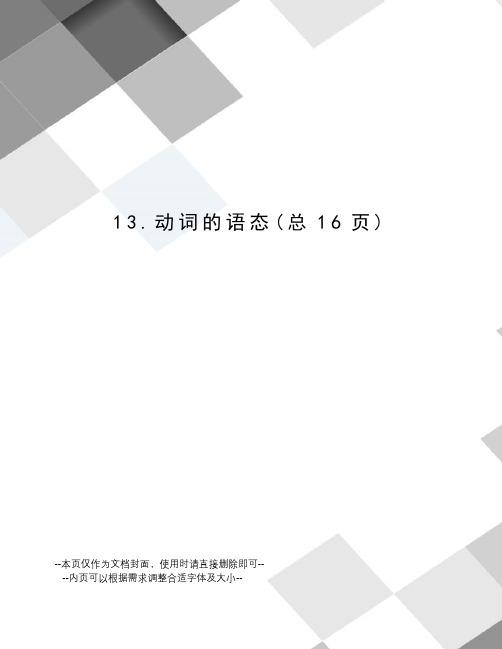
13.动词的语态(总16页)--本页仅作为文档封面,使用时请直接删除即可----内页可以根据需求调整合适字体及大小--动词的语态一、语态的定义和种类语态(voice)是动词的一种形式,表示主语和谓语动词之间的关系。
英语动词有两种语态:主动语态(Active Voice)和被动语态(Passive Voice)。
主动语态表示主语是动作的执行者,被动语态表示主语是动作的承受者。
谓语动词为主动语态的句子叫主动句,谓语动词为被动语态的句子叫被动句。
同一件事情往往可以通过主动句或被动句来表示,侧重点虽有所不同,但意思基本相同。
一般来说,主动语态侧重于行为者,被动语态侧重于动作的对象或动作本身。
例如:主动句:Peter cleaned the meeting room every day. 彼得每天打扫会议室。
被动句:The meeting room was cleaned every day. 会议室每天(由彼得)打扫。
二、被动语态的构成被动语态由“助动词be+ 及物动词的过去分词”构成。
助动词be有时态、人称和数的变化,其变化规则与连系动词be完全一样。
以动词tell为例列表如下:注:英语主动语态的时态共有十六种,而被动语态没有完成进行时,也没有将来进行时态,因此只有上表中的10种。
如果将谓语动词为完成进行时态和将来进行时态的句子变为被动句时,可用完成时态或一般时态表示。
如:1. 用一般时态替代将来进行时态be being discussed …)明天早上这个题目将由我们讨论。
2.用现在完成时态替代现在完成进行时态The machine has been repaired for two hours. (不能用… has been being repaired…)这台机器已经修了两个钟头了。
三、被动语态的否定句、一般疑问句及简略答语构成被动语态的否定结构时,在助动词am, is, are, was, were, have, has, will, shall, would, should后直接加 not;构成被动语态的一般疑问句时,则须将这些助动词提至主语之前,回答用yes或no.如:肯定句:The room was cleaned. 房间扫过了。
中考英语备考 专题03 动词时态及语态(含解析)
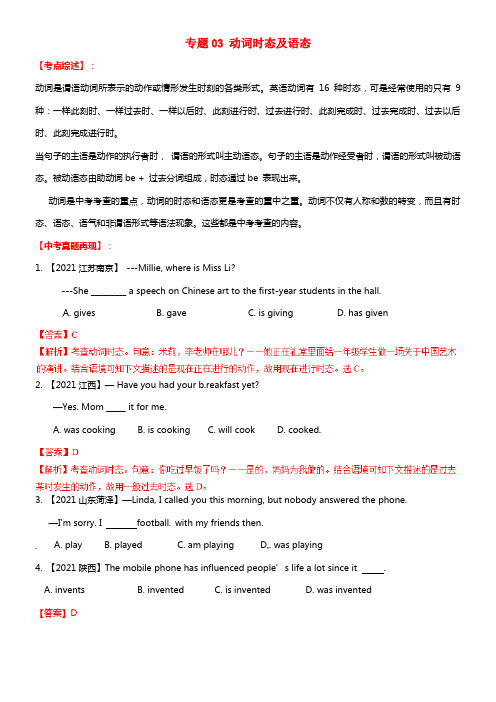
专题03 动词时态及语态【考点综述】:动词是谓语动词所表示的动作或情形发生时刻的各类形式。
英语动词有16种时态,可是经常使用的只有9种:一样此刻时、一样过去时、一样以后时、此刻进行时、过去进行时、此刻完成时、过去完成时、过去以后时、此刻完成进行时。
当句子的主语是动作的执行者时,谓语的形式叫主动语态。
句子的主语是动作经受者时,谓语的形式叫被动语态。
被动语态由助动词be + 过去分词组成,时态通过be 表现出来。
动词是中考考查的重点,动词的时态和语态更是考查的重中之重。
动词不仅有人称和数的转变,而且有时态、语态、语气和非谓语形式等语法现象。
这些都是中考考查的内容。
【中考真题再现】:1. 【2021江苏南京】---Millie, where is Miss Li?---She _________ a speech on Chinese art to the first-year students in the hall.A. givesB. gaveC. is givingD. has given2. 【2021江西】— Have you had your b reakfast yet?—Yes. Mom _____ it for me.A. was cookingB. is cookingC. will cookD. cooked3. 【2021山东菏泽】—Linda, I called you this morning, but nobody answered the phone.—I'm sorry. I football with my friends then.A. playB. playedC. am playingD. was playing4. 【2021陕西】The mobile phone has influenced people’s life a lot since it .A. inventsB. inventedC. is inventedD. was invented【答案】D【解析】考查动词时态及语态。
16种动词的时态和语态

【主动语态】一般现在时:do一般过去时:did一般将来时:willdo现在进行时:be doing(be随人称变化)过去进行时:was/weredoing现在完成时:have/has done过去完成时:had done过去将来时:woulddo将来完成时:will have done将来进行时:will be doing将来完成进行时:will have been doing现在完成进行时:have been doing过去将来完成时:would have done过去完成进行时:had been doing过去将来进行时:would be doing过去将来完成进行时:would have been doing【被动语态】一般现在时:be done(be随人称变化)一般过去时:was/were done一般将来时:will be done现在进行时:be being done(前面的be随人称变化,后面的being固定)过去进行时:was/were being done(being固定)现在完成时:have/has been done过去完成时:had been done过去将来时:would be done将来完成时:will have been done将来进行时:will be being done(being固定)将来完成进行时:will have been being done现在完成进行时:have been being done过去将来完成时:would have been done过去完成进行时:had been being done过去将来进行时:would be being done过去将来完成进行时:would have been being done。
- 1、下载文档前请自行甄别文档内容的完整性,平台不提供额外的编辑、内容补充、找答案等附加服务。
- 2、"仅部分预览"的文档,不可在线预览部分如存在完整性等问题,可反馈申请退款(可完整预览的文档不适用该条件!)。
- 3、如文档侵犯您的权益,请联系客服反馈,我们会尽快为您处理(人工客服工作时间:9:00-18:30)。
12. 动词的语态语态有两种:主动语态和被动语态。
主语是动作的发出者为主动语态;主语是动作的接受者为被动语态。
1)若宾语补足语是不带to 的不定式,变为被动语态时,该不定式前要加"to"。
此类动词为感官动词。
feel, hear, help, listen to, look at, make, observe, see, notice,watchThe teacher made me go out of the classroom.--> I was made to go out of the classroom (by the teacher).We saw him play football on the playground.--> He was seen to play football on the playground.2)情态动词+ be +过去分词,构成被动语态。
Coal can be used to produce electricity for agriculture andindustry.12.1 let 的用法1)当let后只有一个单音节动词,变被动语态时,可用不带to 的不定式。
They let the strange go.---> The strange was let go.2)若let 后宾补较长时,let 通常不用被动语态,而用allow或permit 代替。
The nurse let me go to see my classmate in the hospital.----> I was allowed / permitted to see my classmate in thehospital.12.2 短语动词的被动语态短语动词是一个整体,不可丢掉后面的介词或副词。
This is a photo of the power station that has been set up in myhometown.My sister will be taken care of by Grandma.Such a thing has never been heard of before..12.3 表示"据说"或"相信" 的词组believe, consider, declare, expect, feel , report, say, see,suppose, think, understandIt is said that…据说It is reported that…据报道It is believed that…大家相信It is hoped that…大家希望It is well known that…众所周知It is thought that…大家认为It is suggested that…据建议It is taken granted that…被视为当然It has been decided that…大家决定It must be remember that…务必记住的是It is said that she will leave for Wuhan on Tuesday.12.4 不用被动语态的情况1) 不及物动词或动词短语无被动语态:appear, die disappear, end (vi. 结束), fail, happen, last, lie,remain, sit, spread, standbreak out, come true, fall asleep, keep silence, lose heart, takeplace.After the fire, very little remained of my house.比较:rise, fall, happen是不及物动词;raise, seat是及物动词。
(错) The price has been risen.(对) The price has risen.(错) The accident was happened last week.(对) The accident happened last week.(错) The price has raised.(对) The price has been raised.(错) Please seat.(对) Please be seated.要想正确地使用被动语态,就须注意哪些动词是及物的,哪些是不及物的。
特别是一词多义的动词往往有两种用法。
解决这一问题唯有在学习过程中多留意积累。
2) 不能用于被动语态的及物动词或动词短语:fit, have, hold, marry, own, wish, cost, notice, watch agree with,arrive at / in, shake hands with, succeed in, suffer from, happento, take part in, walk into, belong toThis key just fits the lock.Your story agrees with what had already been heard.3) 系动词无被动语态:appear, be become, fall, feel, get, grow, keep, look, remain, seem,smell, sound, stay, taste, turnIt sounds good.4) 带同源宾语的及物动词,反身代词,相互代词,不能用于被动语态:die, death, dream, live, lifeShe dreamed a bad dream last night.5) 当宾语是不定式时,很少用于被动语态。
(对) She likes to swim.(错) To swim is liked by her.12.5 主动形式表示被动意义1)wash, clean, cook, iron, look, cut, sell, read, wear, feel, draw,write, sell, drive…The book sells well.这本书销路好。
This knife cuts easily.这刀子很好用。
2)blame, let(出租), remain, keep, rent, buildI was to blame for the accident.Much work remains.3) 在need, require, want, worth (形容词), deserve后的动名词必须用主动形式。
The door needs repairing.= The door needs to be repaired.This room needs cleaning. 这房间应该打扫一下。
This book is worth reading.这本书值得一读。
4) 特殊结构:make sb. heard / understood (使别人能听见/理解自己),have sth. done (要某人做某事)。
12.6 被动形式表示主动意义be determined, be pleased, be graduated (from), be finished, beprepared (for), be occupied (in), get marriesHe is graduated from a famous university.他毕业于一所有名的大学。
注意:表示同某人结婚,用marry sb. 或get married to sb. 都可。
He married a rich girl.He got married to a rich girl.12.7 need/want/require/worth注意:当need, want, require, worth(形容词)后面接doing也可以表示被动。
Your hair wants cutting.你的头发该理了。
The floor requires washing. 地板需要冲洗。
The book is worth reading.这本书值得一读。
典型例题The library needs___, but it’ll have to wait until Sunday.A. cleaningB. be cleanedC. cleanD. being cleaned答案A. need (实意) +n /to do,need (情态)+ do,当为被动语态时,还可need + doing.本题考最后一种用法,选A。
如有to be clean 则也为正确答案。
典:done,"不可能已经"。
must not do 不可以(用于一般现在时)。
3.动词的被动语态英语的语态分为主动语态和被动语态。
主动语态表示主语是动作的执行者。
被动语态表示主语是动作的承受者。
只有及物动词才有被动语态。
它的基本结构为:助动词be+及物动词的过去分词。
所有的时态变化在助动词be上。
以动词sing为例。
时态/语态主动语态被动语态一般现在时Jay sings many songs every year. Many songs are sung by Jay every year.一般过去时Jay sang many songs last year. Many songs were sung by Jay last year.一般将来时Jay will sing/ is going to sing many Many songs will be sung/are going tosongs this year. be sung by Jay this year.现在进行时Jay is singing an English song. An English song is being sung by Jay.过去进行时Jay was singing a song just now. A song was being sung by Jay just now.现在完成时Jay has sung lots of songs in the pastfew years. Lots of songs have been sung by Jay inthe past few years.过去完成时Jay had sung plenty of songs by lastyear.Plenty of songs had been sung by Jayby last year.过去将来时Jay said he would sing more songs inthe future.Jay said more songs would be sung inthe future.情态动词的被动语态为:情态动词+助动词be+及物动词的过去分词。
